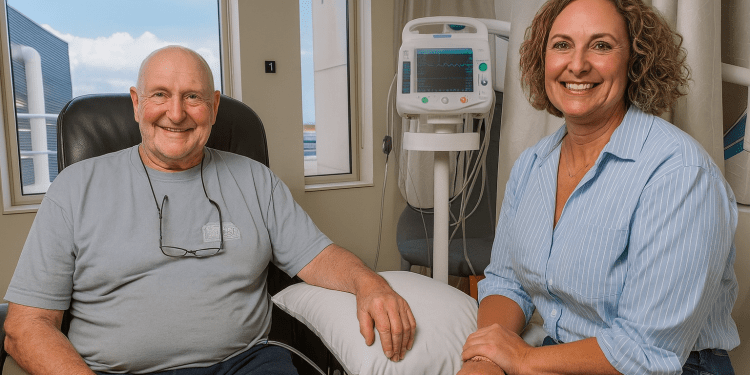Breakthrough Diagnosis Treatment: The Cancer Full Remission That Mystified Doctors
In what some are calling one of the most important cancer treatment stories in a decade, a new experimental drug — dubbed AMP945 — has killed pancreatic cancer that spread to an Australian man’s liver and lungs.
It wasn’t good news for Peter, a former Melbourne mechanic. Pancreatic cancer (PC) is a known entity, characterized by a dismal 5-year survival of less than 10%. But when he enrolled in a clinical trial of a new compound, AMP945, along with chemotherapy, all of his tumors disappeared — a rare outcome in the realm of cancer, called a pathological complete response. “I may be the luckiest bugger in Australia,” Peter told The Australian after follow-up scans and tissue tests at no point indicated cancer.
Breakthrough Drug AMP945 Wipes Out Terminal Cancer: Full Remission Explained
This video explains how AMP945 helped eliminate advanced pancreatic cancer in an Australian man during a clinical trial.
🔬 What is AMP945 and How Does It Function?
AMP945, in the narmafotinib drug class, is an FAK inhibitor and works by inhibiting the activity of the enzyme Focal Adhesion Kinase (FAK). The enzyme is already understood to be critical for helping cancer cells build a protective shield around themselves, making chemotherapy less effective. To put it another way: Inhibiting FAK is crumbling this protective shield and enabling the chemotherapy to get to the poison inside the cancer cells.
It is highly experimental but has the potential to be a broad cure for solid tumors, particularly a deadly type of cancer known as pancreatic adenocarcinoma, which is resistant to drugs. Today’s findings included a Phase 1b/2a clinical trial and that AMP945 is given with gemcitabine and nab-paclitaxel, which are chemotherapy drugs that are currently standard.
📈 What the Data Shows So Far
Well, if Amplia Therapeutics (the makers of AMP945) are to be believed, the early data is certainly pretty damn interesting:
- pCR in any 1 patient (Peter Moulding)
- Decreased tumor size and increased tolerance to chemotherapy
- No significant adverse effects have been definitively linked to AMP945
The trial is still enrolling more participants, and if the results continue to look promising, the researchers hope to start a phase 3 trial in 2026.
🏥 The Promise for Cancer Patients
Pancreatic cancer tends to be diagnosed late and spreads rapidly, and often does not respond to many standard drainage attempts. This makes the success of AMP945 all the more remarkable. Peter’s is not necessarily typical, but it represents an important proof of principle: That when it comes to one of the most lethal cancers in all of medicine, inhibiting FAK can fundamentally increase the potency of chemotherapy, potentially changing the game.
Peter’s findings were “extremely significant, and are providing real momentum to our scientific approach,” said Dr. John Moller, chief executive of Amplia Therapeutics.
🌍 What’s Next?
Larger clinical trials in Australia and the US are still recruiting patients to test it. The company aims for additional published evidence in peer-reviewed publications to be available in Q4 2025. With orphan drug status, the drug could be approved more quickly. Farther down the line, AMP945 might be put to use in other solid tumors, like breast, ovarian, and colorectal — diseases, which, as well, hijack FAK pathways to outmaneuver therapies.
📌 Final Thoughts
The extraordinary recovery of Peter Moulding from terminal pancreatic cancer is much more than just a miracle of modern medicine — it’s the ray of hope tens of thousands who have been struck down believe an incurable cancer cannot deliver. The AMP945 trials are ongoing — and the world is watching. If that approach turns out to work in larger studies, we may be on the brink of a new age of oncology in which even the most horrendous cancers can be conquered.

